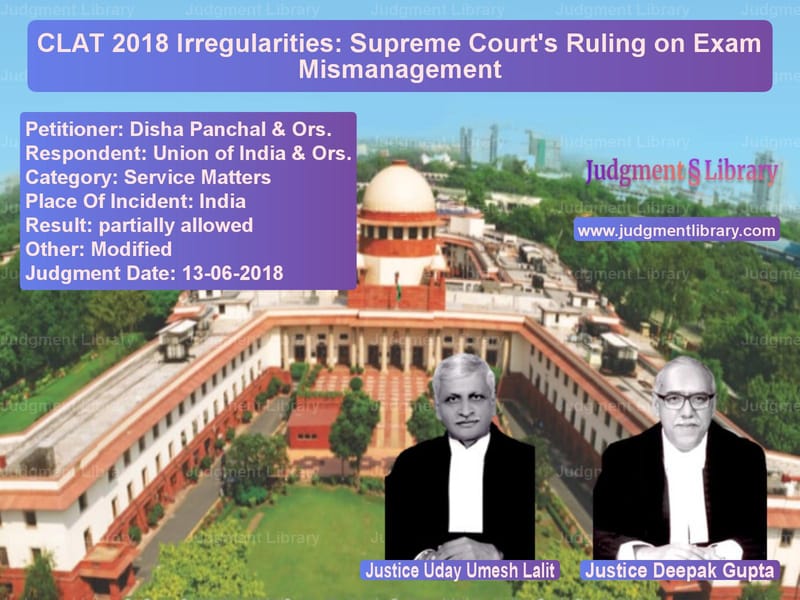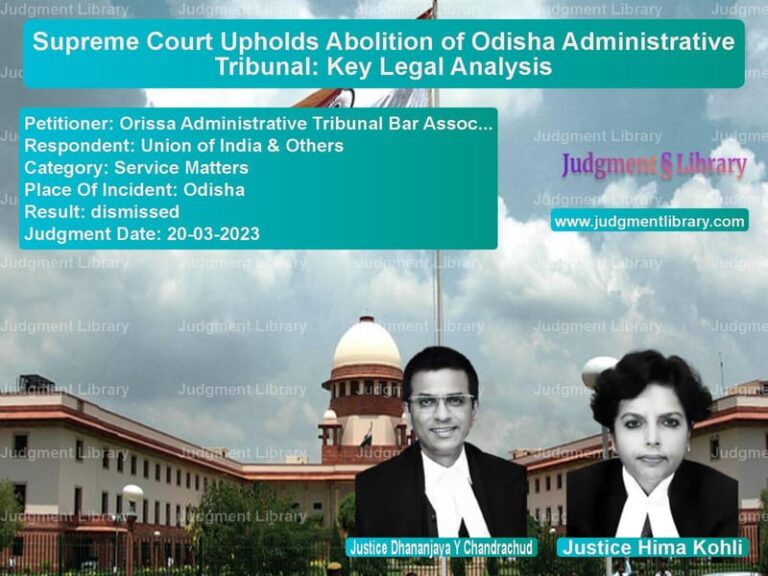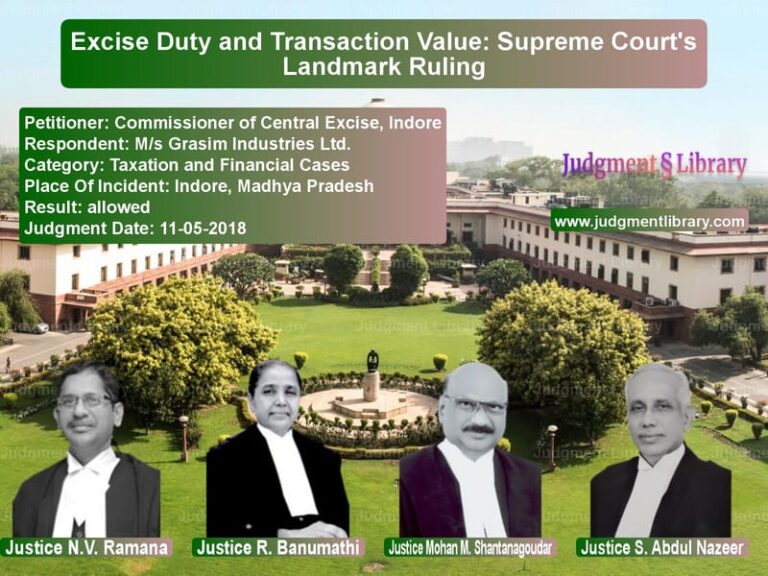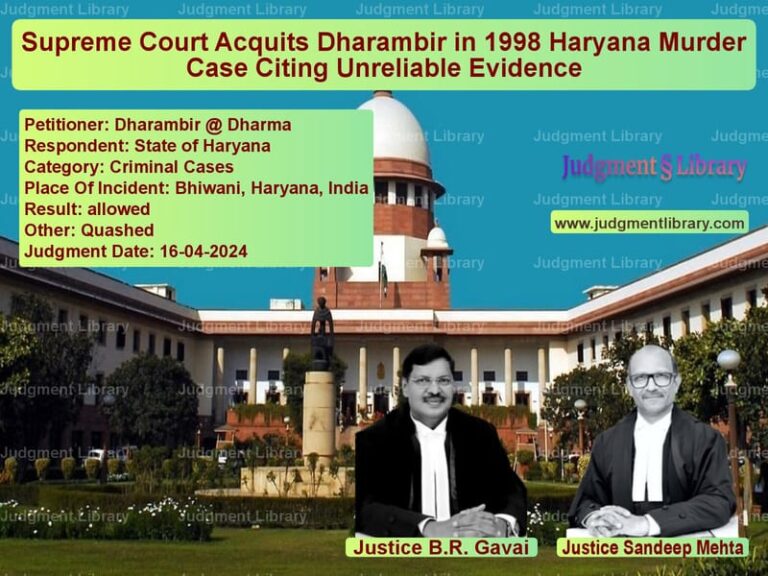CLAT 2018 Irregularities: Supreme Court’s Ruling on Exam Mismanagement
The Supreme Court of India, in the case of Disha Panchal & Ors. vs. Union of India & Ors., addressed significant concerns regarding the conduct of the Common Law Admission Test (CLAT) 2018. The petitioners challenged the fairness of the examination, citing widespread technical glitches, mismanagement, and procedural failures.
The judgment is crucial as it sets a precedent for how large-scale entrance exams should be conducted, ensuring fairness for all candidates. The Court intervened to provide relief for affected students while maintaining the integrity of the exam process.
Background of the Case
CLAT is the entrance examination for 19 National Law Universities (NLUs) in India. The CLAT 2018 examination, conducted online, faced numerous technical issues, leading to legal challenges.
The key complaints raised by candidates included:
- Frequent login failures during the examination.
- Questions disappearing and reappearing intermittently.
- Screen freezing and software crashes.
- Unhelpful or incompetent invigilators who failed to resolve issues.
- Power failures and lack of backup facilities at many exam centers.
- Time loss due to system malfunctions, affecting students’ performance.
Several candidates approached the Supreme Court and various High Courts, demanding either a re-examination or a fair compensation mechanism.
Petitioners’ Arguments
The petitioners contended that the mismanagement of CLAT 2018 resulted in an unfair advantage for some students while disadvantaging others. Their primary arguments were:
- Technical issues during the examination led to unequal exam conditions.
- Many candidates lost valuable time due to system crashes and re-logins.
- The examination conducting body failed to provide a fair and smooth test environment.
- The only fair solution was to either cancel the exam and conduct a fresh one or grant compensation to affected candidates.
Respondents’ Arguments
The respondents, including the CLAT 2018 examination conducting body, defended the examination process:
- Technical glitches affected only a small percentage of candidates.
- A Grievance Redressal Committee (GRC) was constituted to assess complaints.
- Complete re-examination was impractical and would cause disruption.
- Efforts were made to address time loss by granting extensions where possible.
Supreme Court’s Observations
The Supreme Court analyzed the Grievance Redressal Committee’s report, which found that:
- 4,690 candidates had raised formal complaints.
- Many candidates faced login failures and multiple re-logins.
- Technical issues resulted in time loss for several students.
- System malfunctions were not uniformly addressed across test centers.
The Supreme Court emphasized:
- “The CLAT 2018 examination suffered from severe mismanagement, and candidates were affected due to no fault of their own.”
- “Re-examination is not a viable solution, as it would disrupt the entire admission process.”
- “A fair compensation mechanism must be devised to ensure affected students are not unfairly disadvantaged.”
Final Judgment
The Supreme Court ruled that:
- Re-examination for all candidates was not feasible and would cause further disruptions.
- The Court approved a normalization formula to compensate affected candidates.
- The normalization process would account for the time lost due to technical issues and adjust scores accordingly.
- The revised scores would not affect students who had already secured admission based on the initial results.
- Affected candidates would be granted additional ranks and supernumerary seats to accommodate fairness.
The Court also directed the Union of India to appoint a committee to review the examination process and take steps to prevent similar mismanagement in future CLAT exams.
Impact of the Judgment
This ruling sets an important precedent for handling large-scale exam disputes. Key takeaways from the judgment include:
- Examination authorities must ensure technical readiness before conducting online tests.
- A standardized grievance redressal mechanism should be in place for all competitive exams.
- Judicial intervention should focus on fairness and practicality, balancing candidates’ interests with administrative feasibility.
- Re-examinations should be considered only in exceptional cases where fairness cannot be ensured through other means.
With this judgment, the Supreme Court reinforced that technological failures should not jeopardize candidates’ futures. The decision ensures that affected students receive a fair chance while maintaining the integrity of the admission process.
Petitioner Name: Disha Panchal & Ors..Respondent Name: Union of India & Ors..Judgment By: Justice Uday Umesh Lalit, Justice Deepak Gupta.Place Of Incident: India.Judgment Date: 13-06-2018.
Don’t miss out on the full details! Download the complete judgment in PDF format below and gain valuable insights instantly!
Download Judgment: Disha Panchal & Ors. vs Union of India & Ors Supreme Court of India Judgment Dated 13-06-2018.pdf
Direct Downlaod Judgment: Direct downlaod this Judgment
See all petitions in Recruitment Policies
See all petitions in Public Sector Employees
See all petitions in Education Related Cases
See all petitions in Judgment by Uday Umesh Lalit
See all petitions in Judgment by Deepak Gupta
See all petitions in partially allowed
See all petitions in Modified
See all petitions in supreme court of India judgments June 2018
See all petitions in 2018 judgments
See all posts in Service Matters Category
See all allowed petitions in Service Matters Category
See all Dismissed petitions in Service Matters Category
See all partially allowed petitions in Service Matters Category







